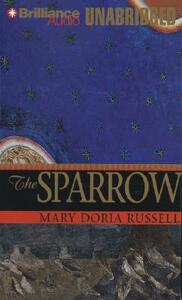Take a photo of a barcode or cover
'The Sparrow' is a masterpiece. It's the kind of book that makes me rethink other five-star reviews I've given. It's the kind of book that'll drive down my grading average for at least the next few months.
This is a science fiction story about, as C.S. Lewis called it, the problem of pain. A novel in the "first contact" subgenre, this near-future story imagines radio astronomers finding music emanating from somewhere in the Alpha Centauri System. Who sponsors mankind's first expedition to contact alien life? The Jesuits.
Things go horrifically, catastrophically wrong. This isn't a spoiler: it's revealed in the first page of the book. 'The Sparrow' is told in two parallel stories: the real-time story of the expedition's crew, how they came together, and the events of the trip; and the after-story of the internal inquisition, involving the deeply traumatized lone survivor, into what went wrong.
So, what makes 'The Sparrow' so remarkable? First, the writing itself is beautiful. Author Mary Doria Russell has a keen ear for the right turn of phrase. She conveys beauty, exaltation, horror, or despair not simply by telling us what happened but as a poet does, by making us feel the emotions in her choice of words and the very rhythms of her sentences. Second, Russel brings her academic background as a paleoanthropologist to bear in creating a wholly alien world with plausible species, cultures, and languages. If you came for the sci-fi, 'The Sparrow' brings the sci-fi! Third, and most importantly, 'The Sparrow' is a serious exploration of faith, trauma, and the problem of pain. Russel asks one of the central questions of those who believe in a personal God: if He's micromanaging the universe, how does one justify horror? If He isn't, why should one bother to worship Him?
'The Sparrow' takes these questions of faith very seriously. The Jesuits, both those on the mission and those conducting the inquiry, are serious and caring people. The mission's crew, both clergy and laypeople, bring varying perspectives, all of them reasonable and compelling. The members of the inquisition, the head of the Jesuit order, and the lone survivor's caregivers are equally diverse in their approaches and equally earnest in their desire to do the right thing.
This novel is a science fiction adventure, a philosophical/theological investigation, and a work of serious literature. It's also a masterpiece. I recommend it without reservation.
This is a science fiction story about, as C.S. Lewis called it, the problem of pain. A novel in the "first contact" subgenre, this near-future story imagines radio astronomers finding music emanating from somewhere in the Alpha Centauri System. Who sponsors mankind's first expedition to contact alien life? The Jesuits.
Things go horrifically, catastrophically wrong. This isn't a spoiler: it's revealed in the first page of the book. 'The Sparrow' is told in two parallel stories: the real-time story of the expedition's crew, how they came together, and the events of the trip; and the after-story of the internal inquisition, involving the deeply traumatized lone survivor, into what went wrong.
So, what makes 'The Sparrow' so remarkable? First, the writing itself is beautiful. Author Mary Doria Russell has a keen ear for the right turn of phrase. She conveys beauty, exaltation, horror, or despair not simply by telling us what happened but as a poet does, by making us feel the emotions in her choice of words and the very rhythms of her sentences. Second, Russel brings her academic background as a paleoanthropologist to bear in creating a wholly alien world with plausible species, cultures, and languages. If you came for the sci-fi, 'The Sparrow' brings the sci-fi! Third, and most importantly, 'The Sparrow' is a serious exploration of faith, trauma, and the problem of pain. Russel asks one of the central questions of those who believe in a personal God: if He's micromanaging the universe, how does one justify horror? If He isn't, why should one bother to worship Him?
'The Sparrow' takes these questions of faith very seriously. The Jesuits, both those on the mission and those conducting the inquiry, are serious and caring people. The mission's crew, both clergy and laypeople, bring varying perspectives, all of them reasonable and compelling. The members of the inquisition, the head of the Jesuit order, and the lone survivor's caregivers are equally diverse in their approaches and equally earnest in their desire to do the right thing.
This novel is a science fiction adventure, a philosophical/theological investigation, and a work of serious literature. It's also a masterpiece. I recommend it without reservation.
I read it all the way through as a matter of policy. Basically some soft core cosplay aesthetic for sado-masochist Catholic asceticism. Can't even fathom why anyone would put a priest on a pedestal as a protagonist while literally every single one of them priests is either a child molester or a child molester enabler. She doesn't even come close to touching the subject other than the "unthinkable" tribulations the victimized protagonist undergoes. A Jesuit none the less, who's organization has caused more misery on this planet and further more on planet Ratchet if it's to be realistic. Has strongly sympathetic themes to colonialism as well. Utter garbage in my book. The prose is very nice though.
adventurous
challenging
dark
emotional
funny
hopeful
informative
inspiring
mysterious
tense
fast-paced
Plot or Character Driven:
A mix
Strong character development:
Complicated
Loveable characters:
Yes
Diverse cast of characters:
Yes
Flaws of characters a main focus:
Complicated
adventurous
challenging
dark
emotional
medium-paced
Plot or Character Driven:
Plot
Strong character development:
Yes
Loveable characters:
Yes
Diverse cast of characters:
Yes
Flaws of characters a main focus:
Complicated
Although I have not read a lot of science fiction I was recommended this book as it was written by an anthropologist. The book was astounding. The story original, the prose exceptional, the plot thoughtfully complex, the characters diverse for the 1990, and the world building fantastic. I kept wanting to read more and more.
I was astounding by the complex anthropological frameworks from biology and anatomy to culture and linguistics. The author truly grasped culture and applied it brilliantly to this book. The book also explored complexities surrounding nature, society, ethics, religion, and space exploration!
This is a book I will go on thinking about for quite some time!
I was astounding by the complex anthropological frameworks from biology and anatomy to culture and linguistics. The author truly grasped culture and applied it brilliantly to this book. The book also explored complexities surrounding nature, society, ethics, religion, and space exploration!
This is a book I will go on thinking about for quite some time!
Moderate: Rape
adventurous
emotional
mysterious
reflective
slow-paced
Plot or Character Driven:
Plot
Strong character development:
Yes
Loveable characters:
Yes
Diverse cast of characters:
Yes
Flaws of characters a main focus:
Complicated
"But it was my body. It was my blood," he said, choking with fury. "And it was my love."
Seduced and ravished by God...sometimes Russell's storytelling took my breath away. Other times I wanted a little more mysticism—a little more blood—I didn't want elegant euphemisms or to be told how to feel about whatever new atrocity God visited upon the party of the Stella Maris. It's almost too much meaning-making; leave us, like Sandoz, in the muck of purposelessness and chaos and bland moronic suffering. For a little while at least. "Make us understand".
(And I deduct points for the constantly, interminably witty dialogue. These guys are exhausted and injured and frightened and traumatized by turns, they don't need to elegantly back-and-forth with each other about it.)
Seduced and ravished by God...sometimes Russell's storytelling took my breath away. Other times I wanted a little more mysticism—a little more blood—I didn't want elegant euphemisms or to be told how to feel about whatever new atrocity God visited upon the party of the Stella Maris. It's almost too much meaning-making; leave us, like Sandoz, in the muck of purposelessness and chaos and bland moronic suffering. For a little while at least. "Make us understand".
(And I deduct points for the constantly, interminably witty dialogue. These guys are exhausted and injured and frightened and traumatized by turns, they don't need to elegantly back-and-forth with each other about it.)
adventurous
challenging
emotional
mysterious
reflective
tense
slow-paced
I read this book because it was required by a class. It was really not at all what I wanted to read when I first started out. It's very religiously, but it doesn't shove it down your throat really but it's still sort of a repulsive amount of god-focusing in here for my liking. The first five chapters are a bloody chore to get through. After that it starts to get interesting enough to keep you reading. I got sort of hung up toward the end and it took me a while to finally get back into reading it. It's an okay read but I probably wouldn't recommend it to anyone. I liked the aliens and I liked that the topics addressed in the book were sort of taboo but the over all composition wasn't really what I had hoped it to be in the end.
I'm still digesting this one. If you liked The Martian (space/frontiers) but want more character development and internal struggle, then this book is for you. Plus first contact with aliens. It has a heavy dose of philosophy and struggling with belief, here specifically wrestling with God in the face of horrible personal experiences. I think world views of all types will enjoy this novel as it does a nice job balancing the religious bits (Catholicism and Judaism) and the science bits. I really wish more people acted like the main characters. They do not always agree with each other but they respect and love each other all the same. It would be a good option for a book club for the discussion possibilities.
This is the only book I have ever read twice. The first time was 15 or so years ago and I remember vaguely that it captivated me but I forgot most of the details. Finishing it now, I feel the same if not more strongly. If you ponder the existence of God in the face of suffering and also wonder what the outcome of first contact could be, this is a book I would wholeheartedly recommend. But it’s also an acquired taste. Hence the “would”.


